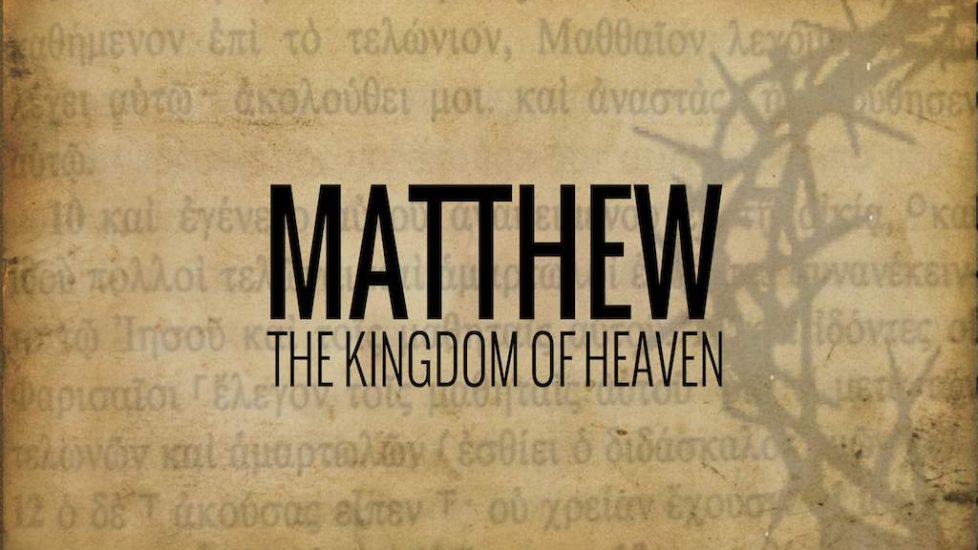Woe to the Hypocrites Part 2
Matthew 23:25-36
In Matthew 23, we are following Jesus’ last words to the crowds of worshippers in the Jerusalem temple in Matthew 23. It is just two days before Jesus will be condemned and crucified. It is His last public encounter with the scribes and Pharisees—the Jewish religious leaders who, on the whole, despised and rejected Jesus. In Matthew 23:1-12, Jesus warned His disciples and the gathered multitudes not to follow the hypocritical practices of the scribes and Pharisees. Then, Jesus turned directly to the scribes and Pharisees themselves and pronounced a series of woes on them. Again and again, Jesus said to them, “Woe to you, scribes and Pharisees, hypocrites!” The woes pronounce God’s judgment, while, at the same time, calling for repentance.
We saw last time that Jesus began by issuing some “woes” over the way their religious hypocrisy harmed other people around them (Matt. 23:13-15), showing that …
1. Hypocrisy Deters People from the Kingdom (Matt. 23:13-15)
Jesus said to them, “you shut up the kingdom of heaven against men; for you neither go in yourselves, nor do you allow those who are entering to go in.” They were making converts to themselves and to hell, not to the kingdom of God (Matt. 23:15).
Then He spoke two “woes” over the way their religious …
2. Hypocrisy Distorts the Word of God (Matt. 23:16-24)
They distorted the word of God and dishonored God by majoring on the minor points of the law and minimizing the main points. He called them “Blind guides, who strain out a gnat and swallow a camel!” (Matt. 23:24).
And now, He speaks three remaining “woes” over the way their religious hypocrisy harmed these very hypocrites themselves (Matt. 23:25-36). He speaks two woes to expose that …
3. Hypocrisy Disguises an Unclean Heart (Matt. 23:25-28)
Jesus gives two illustrations of this truth. First, He uses the illustration of washing dishes, saying,
25 “Woe to you, scribes and Pharisees, hypocrites! For you cleanse the outside of the cup and dish, but inside they are full of extortion and self-indulgence.” (Matt. 23:25).
Imagine cleaning only the outside of your dishes, but letting the inside (where the food goes) collect all the grime, scum, and filth from being used time after time unwashed. How ridiculous! None of us would want to eat from dishes that contained putrid food and garbage.
Now, the Pharisees had meticulous traditions and rules about washings. Matthew’s first readers likely knew all these cleansing ceremonies. But Mark, in his Gospel, explains these customs, writing,
3 For the Pharisees and all the Jews do not eat unless they wash their hands in a special way, holding the tradition of the elders. 4 When they come from the marketplace, they do not eat unless they wash. And there are many other things which they have received and hold, like the washing of cups, pitchers, copper vessels, and couches. (Mark 7:3-4).
Many of these traditions concerning washings and cleansings had their basis in the Old Testament law. But one problem we already saw with these washings back in Matthew 15 was that the Pharisees held their traditions above the commands of scripture. Jesus told them in Mark 7:9, “All too well you reject the commandment of God, that you may keep your tradition” (cf. Matt. 15:3-6).
But, again, the problem Jesus confronts here is their hypocrisy, specifically, the hypocrisy of their priorities. They made great efforts to cleanse their external appearance, but they ignored their internal iniquity. They took great pains to ceremonially clean their cups and plates, following the letter of the law and their traditions. And they thought that by doing so, they themselves were “clean”. Outside they appeared pristine. But Jesus says, “inside they are full of extortion and self-indulgence” (Matt. 23:25). The word “extortion” means plundering, robbery. Their heart was full of greed to the point where they thought nothing of devouring “widows’ houses” (Matt. 23:14), preying on the poor and defenseless. Their hearts were also full of “self-indulgence,” that is, lacking self-control or restraint. Their hearts were given over to greedy, unrestrained self-gratification. The Pharisees “plundered both the souls and the wallets of the people and used the ill-gotten gains to serve themselves.”[1]
Jesus’ solution for their problem is in Matthew 23:26, “26 Blind Pharisee, first cleanse the inside of the cup and dish, that the outside of them may be clean also.” The Lord is primarily concerned with your heart. It’s not that He isn’t concerned about your external behavior. He is. However, the way that God has made us is that the outside is controlled by the inside. When your heart is clean inside, your behavior will become clean outside.
Next, Jesus uses the illustration of white-washed tombs. He says, “Woe to you, scribes and Pharisees, hypocrites! For you are like whitewashed tombs which indeed appear beautiful outwardly, but inside are full of dead men’s bones and all uncleanness.” (Matt. 23:27). Each year before Passover the people of Jerusalem would whitewash the tombs as a safeguard for the pilgrims traveling to the feast, painting them with white, powdered lime dust. That way, the pilgrims would be careful not to accidentally touch or rest themselves against a tomb, which would make them ceremonially unclean and unable to partake of the Passover. Jesus says that’s what the Pharisees are like. They are all clean and sparkly on the outside, but their insides are like dead men’s bones. Outwardly, they appeared holy, but spiritually, they were dead. In their spiritual deadness, they were not only inwardly defiled themselves, but they also contaminated anyone who came near them.
And they did it all to look good in front of others. Jesus says, “Even so you also outwardly appear righteous to men, but inside you are full of hypocrisy and lawlessness.” (Matt. 23:28). They wanted to appear righteous before people, but neglected to be righteous before God. They forgot that God looks at the heart. He sees their hypocrisy and lawlessness. Jesus took off their mask of external morality and religious play acting, exposing their rebellion against God and His law.
Without the inner cleansing of the heart, religious display is worse than useless; it is deception. And the danger is that the hypocrite may not only deceive others, but he usually even deceives himself into thinking that all his religious white-washing means that he is truly righteous. Jesus sees the truth. He says they are full of death, uncleanness, hypocrisy, and lawlessness. Charles Spurgeon preaching about hypocrisy says,
Secret sins bring fevered eyes and sleepless nights, until men burn out their consciences, and become in very deed ripe for the pit. Hypocrisy is a hard game to play at, for it is one deceiver against many observers; and for certain it is a miserable trade, which will earn at last, as its certain climax, a tremendous bankruptcy.[2]
Hypocrisy disguises an unclean heart. And the danger of this is, that without a clean heart, no one will see God. In the Sermon on the Mount in Matthew 5, Jesus said, “Blessed are the pure in heart, For they shall see God.” (Matt. 5:8). David asks in Psalm 24,
3 Who may ascend into the hill of the LORD?
Or who may stand in His holy place?
4 He who has clean hands and a pure heart,
Who has not lifted up his soul to an idol,
Nor sworn deceitfully.
5 He shall receive blessing from the LORD,
And righteousness from the God of his salvation. (Psalm 24:3-5).
Only the holy, the pure in heart, may stand in the Lord’s presence. But this is exactly why God sent His Son to save us.
Through the prophet Ezekiel, the Lord made this promise about the New Covenant,
25 “Then I will sprinkle clean water on you, and you shall be clean; I will cleanse you from all your filthiness and from all your idols. 26 I will give you a new heart and put a new spirit within you; I will take the heart of stone out of your flesh and give you a heart of flesh. 27 I will put My Spirit within you and cause you to walk in My statutes, and you will keep My judgments and do them.” (Ezekiel 36:25-27).
A cleansed and purified heart is a work of God by faith through His grace, not something we can accomplish on our own. Only God can give us a clean heart through His Spirit because of the redemption of Christ. He causes us to be born again (John 3:3-8) as new creations in Christ (2 Cor. 5:17). This is how, in Acts 15, Peter describes the salvation that God granted to both Jews and Gentiles,
“Men and brethren, you know that a good while ago God chose among us, that by my mouth the Gentiles should hear the word of the gospel and believe. 8 So God, who knows the heart, acknowledged them by giving them the Holy Spirit, just as He did to us, 9 and made no distinction between us and them, purifying their hearts by faith.” (Acts 15:7-9).
Listen, Christianity is never just cleaning up our external appearance. It is always the Holy Spirit of God in Christ purifying our heart by faith. Look to Christ alone. Only in Christ can you be forgiven and cleansed from your polluting sins. Only in Christ can our hearts be transformed. Look to Christ and the cross. “For the message of the cross is foolishness to those who are perishing, but to us who are being saved it is the power of God.” (1 Corinthians 1:18).
So, we see the danger of hypocrisy to ourselves and others, because it deters people from the kingdom of heaven, it distorts the word of God, and it disguises an unclean heart. The final woe shows us that …
4. Hypocrisy Dooms to Judgment (Matt. 23:29-36).
The last woe is for persecuting the prophets. It comes in Matthew 23:29-33, and then Jesus predicts further persecution and pronounces judgment on their generation. This final “woe” stands out from those that preceded it because Jesus gives it the longest treatment. And while the other “woes” our Lord speaks in this chapter dealt with the present hypocritical actions of the scribes and Pharisees, this “woe” deals with actions involving not only the present but also in Israel’s past and their future. Notice the harsh condemnations the Lord spoke in this “woe”. Jesus says,
29 “Woe to you, scribes and Pharisees, hypocrites! Because you build the tombs of the prophets and adorn the monuments of the righteous, 30 and say, ‘If we had lived in the days of our fathers, we would not have been partakers with them in the blood of the prophets.’ 31 Therefore you are witnesses against yourselves that you are sons of those who murdered the prophets. 32 Fill up, then, the measure of your fathers’ guilt. 33 “Serpents, brood of vipers! How can you escape the condemnation of hell?” (Matt. 23:29-33)
First, Jesus exposed the hypocrisy of the religious leaders who pretended to honor God’s prophets and righteous men from the past. They knew that God’s prophets down through the centuries were all persecuted by their forefathers. For instance, consider Moses. In the wilderness, the people grumbled and rebelled against him (Exodus 15-17). Consider Samuel. The people didn’t listen to him either but instead demanded a king (1 Sam. 8). Elijah said of the people of Israel, “the sons of Israel have forsaken Your covenant, torn down Your altars and killed Your prophets with the sword. And I alone am left; and they seek my life, to take it away” (1 Kings 19:10). Isaiah was despised. Tradition has it that he was sawn in two (Heb. 11:37). Jeremiah was hated. The priests, (false) prophets, and all people seized him saying, “You must die!” (Jer. 26:8). On several occasions, he was placed in prison (Jer. 32, 37). They even threw him into a pit and left him to die (Jer. 38).
As the writer of Hebrews says, God’s Old Testament prophets and righteous men suffered “trial of mockings and scourgings, yes, and of chains and imprisonment. They were stoned, they were sawn in two, were tempted, were slain with the sword. They wandered about in sheepskins and goatskins, being destitute, afflicted, tormented—of whom the world was not worthy. They wandered in deserts and mountains, in dens and caves of the earth” (Hebrews 11:36-38).
Now, the generation of Jesus’ day pretended to honor men like Moses and Elijah and Isaiah and Jeremiah by building them monuments and decorating them in their honor. Sinful hypocrites tend to prefer dead prophets over living ones. And they decorated these monuments with the boastful self-assurance that, if they had lived in those days, they would never have done those horrible things to God’s prophets that their fathers had done. They thought that their religious display somehow separated them from the sins of their fathers.
But Jesus points out the continuity between the murderous acts of their fathers, and their own murderous intentions. Even then, the scribes and Pharisees had already begun to plot how they would put Jesus, the Son of God, to death. Matthew tells us back in Matthew 12:14 that, “the Pharisees went out and plotted against Him, how they might destroy Him.” In Matthew 16:21, Jesus began to show His disciples that “He must go to Jerusalem, and suffer many things from the elders and chief priests and scribes, and be killed, and be raised the third day“. And in Matthew 21:45-46, we’re told that when the chief priests and Pharisees heard His parables He spoke against them “they sought to lay hands on Him.”
Do you see their hypocrisy? They were pretending to honor God’s murdered prophets from the past, while perpetuating the murderous acts of their fathers in the present. Jesus says, “Therefore you are witnesses against yourselves that you are sons of those who murdered the prophets” (Matt. 23:31). He tells these scribes and Pharisees, “Fill up, then, the measure of your father’s guilt” (Matt. 23:32). They would add to their fathers’ guilt the ultimate guilt of murdering the Son of God. Thus, Jesus both exposes their treachery and releases them to do their murderous work. And so, that very week, this most privileged of all generations demanded that Jesus Christ, the Son of God, be crucified. And they stood there mocking Him as He hung on the cross. This is why Jesus said, “Serpents, brood of vipers! How can you escape the condemnation of hell?” (Matt. 23:33).
The great deception of this form of religious hypocrisy is that it allows them to honor God’s great works of the past, and to make great declarations of what they would have done in someone else’s time, and to think that they’ve actually accomplished something “spiritual” in saying such things. And yet, the whole time, they are covering up and ignoring their own disbelief and sinful rebellion in the present.
I wonder if, like me, you have ever wondered what you would have done with Jesus if you had lived in that generation? If I were in the crowd and heard Pilate ask, “Whom do you want me to release to you? Barabbas, or Jesus who is called Christ?” (Matt. 27:17), what would I say? Because of the sinfulness of my own heart, would I have also said, “Barabbas” as the multitudes did (Matt. 27:21)? If I were in the crowd and heard Pilate ask, “What then shall I do with Jesus who is called Christ?” (Matt. 27:22), would I have joined those who said, “Let Him be crucified!” (Matt. 27:23)? As confident as I might be to say, like Peter, “Even if all are made to stumble because of You, I will never be made to stumble” (Matt. 26:33), I know, like Peter, I am weak of will and feeble of heart. I might have denied Jesus three times that night just as Peter did. (Matt. 26:75).
Do you know the weakness of your heart? These scribes and Pharisees didn’t. They disguised their impure hearts and refused to recognize their own sin. They fooled themselves into thinking that they were more righteous than they were.
Listen, there is hope for the soul that realizes his sin. Jesus said, “Those who are well have no need of a physician, but those who are sick … For I did not come to call the righteous, but sinners, to repentance.” (Matt. 9:12-13). But hypocrisy dooms people to condemnation in judgment because they will not recognize their sin and repent.
Jesus goes on to predict their future treachery that would expose the full guilt of their generation:
34 “Therefore, indeed, I send you prophets, wise men, and scribes: some of them you will kill and crucify, and some of them you will scourge in your synagogues and persecute from city to city, 35 that on you may come all the righteous blood shed on the earth, from the blood of righteous Abel to the blood of Zechariah, son of Berechiah, whom you murdered between the temple and the altar. 36 Assuredly, I say to you, all these things will come upon this generation.” (Matt. 23:34-36).
Look at that first word in Matthew 23:34, “Therefore . . .” Jesus is saying that, because of their hypocrisy, because they truly had the same murderous intent of their fathers, because underneath their religious façade they were snakes and vipers who were doomed to the judgment of hell, He pronounces their judgment that is coming.
Jesus declares Himself to possess the authority of God, declaring Himself to be the one who will send them prophets from God. He is about to send them more prophets and apostles (Luke 11:49; John 20:21), and what they would do to them would prove what they really are. As Stephen, while filled with the Holy Spirit, would preach to them in Acts 7,
“You stiff-necked and uncircumcised in heart and ears! You always resist the Holy Spirit; as your fathers did, so do you. Which of the prophets did your fathers not persecute? And they killed those who foretold the coming of the Just One, of whom you now have become the betrayers and murderers, who have received the law by the direction of angels and have not kept it” (Acts 7:51-53).
They immediately killed Stephen for those words, too. They revealed their true character in how they treated him, just as they treated the Son of God. Acts records that the Jewish leaders of that generation drove the apostles and the believers out of the temple, then out of Jerusalem, and then followed them from city to city—persecuting them, scourging them, crucifying them, and killing them. Jesus says that all the righteous blood shed on the earth, “from the blood of righteous Abel to the blood of Zechariah,” would be laid upon that generation. Abel was the first martyr in the book of Genesis, murdered by his unrighteous brother Cain in anger and jealousy over Abel’s righteous worship. Zechariah is the prophet murdered by the Jews in the last historical book of the Hebrew scriptures, 2 Chronicles. And so, it was as if Jesus was telling that generation that the long history of the blood of every righteous saint who was slain for righteousness sake—from the first book to the last—would be laid on that generation!
That generation did suffer the multiplied guilt and judgment they and their fathers had brought upon themselves. About forty years later, just as Jesus prophesied, Jerusalem was utterly destroyed by the Roman armies of Titus, and the people slaughtered or scattered around the world.
Why? Why would they be held guilty for all of that? Because they will reject and crucify the Messiah, the Son of God, the Righteous One whom God sent to be the Savior. They could not be forgiven—they would eternally be guilty—if they persisted in rejecting the only Savior. No one can be saved if they refuse to repent and believe in Jesus Christ.
If you want to avoid condemnation in God’s judgment, you need to recognize your sinfulness. These hypocrites failed to recognize their sinfulness and repent. They proudly boasted in their righteousness, “Oh, we would never do what our fathers did!”; “We would never persecute the righteous.” But they did—they did it even worse than their fathers did. They rejected and crucified the Son of God.
Hypocrisy dooms those who practice it to be condemned by God in judgment. Jesus said, “How can you escape the condemnation of hell?” (Matt. 23:33). The Gospel is clear. The way to escape the condemnation of hell is to repent and believe in Jesus Christ. You must be born again! You must be given a clean heart and a new spirit by faith in Christ.
I wonder if you’re wearing a mask this morning. Are you trying to pretend that you have it all together, when deep inside you know you can’t keep up the act much longer? The cure for hypocrisy is not to change anything on the outside. It’s not a matter of doing more things, of trying to get more religious. That just perpetuates the wearing of masks. If you want to change, if you want to truly become someone you’ve never been before, the change has to take place on the inside.
I know of only one person who can affect that kind of change. His name is Jesus Christ. Stop playing Christian charades. Stand before Him and admit that you’re a sinner. Repent and believe that He died for your sins and was raised to give you a new life. Leave the ranks of the religious hypocrites and join the ranks of the forgiven sinners.
— NOTES ————————————————————–
[1] John MacArthur, New Testament Commentary: Matthew 16-23, Moody Publishers, Chicago IL, p. 386.
[2] Charles Haddon Spurgeon, Secret Sins, New Park Street Pulpit Volume 3, https://www.spurgeon.org/resource-library/sermons/secret-sins/#flipbook/ accessed 08/21/2025.



